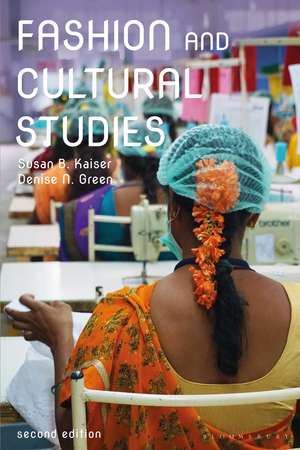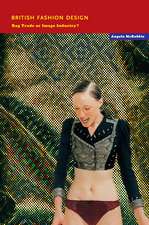Fashion and Cultural Studies
Autor Susan B. Kaiser, Denise N. Greenen Limba Engleză Paperback – dec 2021
| Toate formatele și edițiile | Preț | Express |
|---|---|---|
| Paperback (1) | 176.74 lei 3-5 săpt. | +36.88 lei 7-13 zile |
| Bloomsbury Publishing – dec 2021 | 176.74 lei 3-5 săpt. | +36.88 lei 7-13 zile |
| Hardback (1) | 501.48 lei 3-5 săpt. | |
| Bloomsbury Publishing – dec 2021 | 501.48 lei 3-5 săpt. |
Preț: 176.74 lei
Preț vechi: 188.72 lei
-6% Nou
Puncte Express: 265
Preț estimativ în valută:
33.82€ • 35.40$ • 27.98£
33.82€ • 35.40$ • 27.98£
Carte disponibilă
Livrare economică 15-29 martie
Livrare express 01-07 martie pentru 46.87 lei
Preluare comenzi: 021 569.72.76
Specificații
ISBN-13: 9781350104686
ISBN-10: 135010468X
Pagini: 288
Ilustrații: 20 bw illus and 30 color illus
Dimensiuni: 156 x 234 x 20 mm
Greutate: 0.57 kg
Ediția:2
Editura: Bloomsbury Publishing
Colecția Bloomsbury Visual Arts
Locul publicării:London, United Kingdom
ISBN-10: 135010468X
Pagini: 288
Ilustrații: 20 bw illus and 30 color illus
Dimensiuni: 156 x 234 x 20 mm
Greutate: 0.57 kg
Ediția:2
Editura: Bloomsbury Publishing
Colecția Bloomsbury Visual Arts
Locul publicării:London, United Kingdom
Caracteristici
With two new chapter exploring: 1) religion, spirituality, and faith in relation to style, fashion, and dress and 2) a critique of "beauty" inclusive of diverse sizes, shapes and dis/abilities.
Notă biografică
Susan B. Kaiser is a Professor at the University of California, Davis, in the Departments of Gender, Sexuality, and Women's Studies; and Design. She is the author of The Social Psychology of Clothing (Fairchild 1997), and more than 100 journal articles and book chapters. She is also the editor of the journal Critical Studies in Fashion & Beauty. Denise N. Green is an Associate Professor at Cornell University where she also directs the Cornell Fashion + Textile Collection. She is on the editorial boards of the Clothing and Textiles Research Journal, Fashion Studies, Critical Studies in Fashion & Beauty, and was the Vice President of Publications for the Costume Society of America, 2017-2021.
Cuprins
List of IllustrationsAcknowledgments1. Fashion Studies and Cultural StudiesArticulationStyle-fashion-dressThe fields of fashion studies and cultural studiesConceptualizing culture and fashionCircuit of style-fashion-dress modelProductionConsumptionDistributionSubject formationRegulation2. Intersectional, Transnational Fashion SubjectsAssumption 1: Structure-agency dynamics include processes of persuasion, consent, and resistance. Assumption 2: Subject formation through style-fashion-dress is a process of navigating intersectionalities.Assumption 3: Structures of feeling - expressed through subject formation and the fashion process alike - articulate between everyday life and culture through the circuit of style-fashion-dressAmbiguityCultural AmbivalenceCultural AnxietyAssumption 4: The field of critical fashion studies needs to move from identity nots to identity (k)notsAssumption 5: Fashion is transnational - not merely western or "Euromodern"Assumption 6: The process of negotiating ambiguity is not a level playing field, and it is a material process - especially in a transnational context3. Fashioning the National Subject Nation ? essence Nation as different than: Representing the otherFolk costume, national dress and fashionWorking the hyphen: Nation-state and style-fashion-dressFrench RevolutionChinese Cultural Revolution (and beyond)From European expansion to globalizationDecolonizing fashion: Beyond the metaphorGlobalizationIntersectionalities and entanglements4. Racial Rearticulations and EthnicitiesRace and ethnicity: Sliding signifiersRacial and ethnic rearticulationsColorHairEthnic re-articulations: Belongings-in-DifferenceSliding into appropriation, sliding into religion5. Religion, Fashion, and SpiritualitySubject formation Spirituality, subjectivity, and materiality Modesty Piety, orthodoxy, religiosity Regulation State alignment with religionFreedom from religionFreedom of religion (religious freedom)Production, distribution, and consumption The Jewish diaspora and the textile, clothing, and retail industries The globalization of Muslim fashion 6. Class Matters, Fashion MattersConceptualizing classCaste systemsSumptuary laws, materials, and the "natural" orderClass, intersectionalities, and industrial capitalismFrom textile to apparel production: At home, in the factory, and in protestClass and fast fashionMetaphors of class structure and change: The flows of fashionStatus claims and status demurrals7. Gendering Fashion, Fashioning Gender: Beyond BinariesSoft assemblagesMarking, unmarking, and remarking genderSex, gender, and style-fashion-dress: Feminist deconstructionsTheorizing the body and style-fashion-dressTransgender studies through bodies and style-fashion-dressMenswear out of the academic closetMultiple masculinitiesZoot suitLa SAPE in CongoUS National Survey of Male Intersectionalities8. Sexual Subjectivities and Style-Fashion-DressSexual subjectivitiesBinary "beginnings" and reversalsHomophobic discoursesOn the protracted coming out of heterosexuality1960s and 1970s: Social movements and sexual fashions1980s and beyond: Queering fashionGazing subjects and positionalitiesSexuality through intersectionalities9. Dressed EmbodimentFrom phenomenology to dressed embodimentAbstracting the body and representing embodiment Anthropometrics and sizingStigmatizing and celebrating fat bodiesSizeism and the fashion industryFlaunting fatDis/abled bodiesAthletics and bodily exceptionalismAddressing ableismDisabling environments and style-fashion-dressFashioning disability ConcealmentDiversion and reframingModifying and makingCompensationSocial uniquenessSocial inclusionEmbodied subjectivities10. Bodies in Motion Through Time and SpaceTime and space (and place) Age/generation and placeFashion's way with time in space: SpatiotemporalitiesIndustrial time Anti/nonlinear time and space NostalgiaSpace-Time compression and "speed space" Uchronic temporality and utopian spacesClosing/opening thoughtsBibliographyIndex
Recenzii
The second edition of Fashion and Cultural Studies is the resource that fashion scholars, students, activists and designers need at this time of deep transformation in the field of fashion. It brings together critical theories about power and marginalization and illuminates how these frameworks advance understandings of fashion with nuance and accessibility. This book will inspire readers to question, expand and reimagine how they think about fashion in society, and it offers them the interdisciplinary worldviews to advance social justice through their own work.
Building upon the critical foundation that Susan Kaiser provided for us in 2012, Denise Green and Kaiser work collaboratively to deepen our understanding of the phenomenon of fashion, drawing upon new ways of considering Style-Fashion-Dress. Fashion and Cultural Studies is a recommended text for educators to assign in the classroom, as it offers the most robust and cogent framework for examining why we wear what we wear, focusing on its sociopolitical implications in today's climate.
This exciting book demonstrates how Fashion Theory deepens the theoretical and militant tradition of cultural studies in our time, in relation particularly to issues such as bodies, multiple identities, social inclusion, identity/alterity, spirituality. Even more than in the previous edition, the book shows how fashion can be a true political, ethical and aesthetic passion.
Fashion and Cultural Studies is an innovative, engaging, and refreshing text where Susan Kaiser and Denise Green examine the numerous entanglements of identity, fashion, style, dress, (to use their words) "both/and" the body. In the text and imagery, they center and prioritize examples from historically marginalized communities and they also engage in important critical self-reflection as white, middle-class US American women; other fashion studies scholars need to follow their example. This much-needed book is required reading for those interested in, and perhaps more importantly those not interested in, fashioning identities and justice.
Building upon the critical foundation that Susan Kaiser provided for us in 2012, Denise Green and Kaiser work collaboratively to deepen our understanding of the phenomenon of fashion, drawing upon new ways of considering Style-Fashion-Dress. Fashion and Cultural Studies is a recommended text for educators to assign in the classroom, as it offers the most robust and cogent framework for examining why we wear what we wear, focusing on its sociopolitical implications in today's climate.
This exciting book demonstrates how Fashion Theory deepens the theoretical and militant tradition of cultural studies in our time, in relation particularly to issues such as bodies, multiple identities, social inclusion, identity/alterity, spirituality. Even more than in the previous edition, the book shows how fashion can be a true political, ethical and aesthetic passion.
Fashion and Cultural Studies is an innovative, engaging, and refreshing text where Susan Kaiser and Denise Green examine the numerous entanglements of identity, fashion, style, dress, (to use their words) "both/and" the body. In the text and imagery, they center and prioritize examples from historically marginalized communities and they also engage in important critical self-reflection as white, middle-class US American women; other fashion studies scholars need to follow their example. This much-needed book is required reading for those interested in, and perhaps more importantly those not interested in, fashioning identities and justice.








